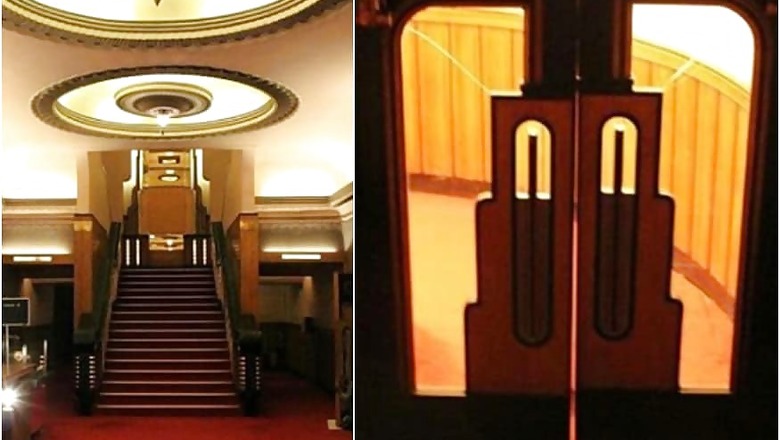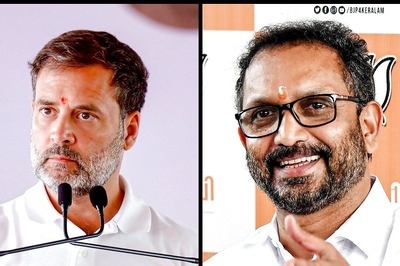
views
When the Lumiere Brothers screened the first moving images in 1896, viewings were meant to be for a large public gathering under one roof. The understanding was that it could promote the community experience, and shared living could give a new form of commercially viable entertainment.
Now, more than 12 decades later, cinema halls that went through several changes since the concept came into existence, are under threat, thanks to coronavirus pandemic.
Read: Myth of the Big Screen Experience: Do You Really Need to go to Theatres Anymore?
It’s an attack from two sides— virus induced and economic recession. The question that everyone is asking now is: Will cinema halls return to their former glory anytime soon? Or, for that matter, ever?
If the general consensus of the public and establishment is to be considered, cinemas are in for jolt. The last big Bollywood movies that turned out to be lucrative for halls, distributors, financiers and producers were Good Newwz and Tanhaji: The Unsung Warrior. Both features were commercially hit ventures and did box office business of close to Rs 200 crore in January.
Since then, neither a movie could gather crowds in such huge numbers nor the coronavirus allowed big features like Sooryavanshi, Black Widow, Mulan and '83 to debut as scheduled. Now, as social distancing and extreme public hygiene become the new norms, there is hardly any chance that audiences would want to go back to the cinemas and risk contracting the virus.
However, it is still premature to assume that cinema halls, one of the oldest forms of group entertainment, will not be making a comeback after Covid-19 abates. There are several reasons for it but lets take a look at some of the most glaring problems in the argument that 'we may be content with not visiting the cinema halls anymore'.
Cinema experience
Avatar (2009) changed the game for movie business once and for all. The 3-D experience and the art behind the movie's conception was so robust that it became an internationally record-breaking movie. All action and sci-fi films that followed suit now had a template they would want recreate or learn from to master global reach.
The argument that home-movies match this level of audio-visual experience does not hold water for masses because such technology is quite expensive as of now and moreover the set up takes large space inside the house. Plus, sound system will add more to the expenses and power cuts may also ruin the viewing experience.
Quality of streaming
It has only been several months since the lockdown and streaming sites have been reducing the picture quality of content to cut down data consumption and so that maximum users can reap the benefits of viewings in their private spaces. With reducing internet bandwidth, quality of streaming suffers and that in turn affects our experience of immersive movie watching. Thus, this rival that theatre has found in streaming sites will only add more value to the cinema experience which is uninterrupted and enriching.
Consumption patterns
For lower and middle class audiences, heading to cinema halls has long been cherished. Even well-off families opt for cinema outings every now and then to break monotony and enjoy family time. In this, not only does cinema provide an affordable form of entertainment, but also becomes a place where thoughts and communities thrive together, irrespective of class. The fact that Joker (2019) could draw such a massive response was to a large extent driven by the fact that it was enjoyed en masse.
Streaming not as profitable for movie makers
Considering international blockbusters, especially Hollywood mega budget movies, are made kept in mind the cinema going audiences, the makers themselves will try and oppose streaming sites to a large extent. The fact that Fast and the Furious 9, Sooryavanshi etc have delayed release indefinitely, only asserts to the financiers' need to release a movie in a theatre first so that a certain monetary value can be derived from the material, that is, the reel.
On the flip side, after the Covid-19 pandemic has struck, the theatre staffers are on leave, malls and multiplexes are closed. Producers are left with no choice but to make recently released films available for streaming within a short span-- Angrezi Medium, Baaghi 3 and Love Aaj Kal are examples.
In the next step, there are strong chances that many projects could directly wind up on OTT, fearing lack of newly available content and in order to just stay relevant. There are reports doing the rounds that Akshay Kumar's Laxmmi Bomb and Amitabh Bachchan's Gulabo Sitabo will be the first movies to mark the beginning of this trend in Bollywood.
Stardom of fledgling actors goes for a toss as they buckle up for delayed appreciation of their art. But, all is not lost and we ought not to look at streamers as something that is not on par with cinemas. Roma, House of Cards, to name a few, have already ushered in a new era where quality content not only defies geographical boundaries and reaches people but also breaks the entrenched ideas that cinema halls are in anyway supreme.
Still, it’s hard to predict when tide will turn back in favour of theatres. For now, they are aiming at sustenance and ideas being thought of already for a post Covid-19 world. Multiplex chains are thinking of making seating arrangements as per social distancing guidelines. It has been reported that viewers will be able to sit leaving one seat vacant for now and enjoy the cinema experience.
But, in such a case, is it wise on their behalf to assume that people will pay extra to not sit with near and dear ones? Guess not, since not only are cinema halls source of pleasure and entertainment but also a space where intimacy and experiences are shared. Having said that, is our relationship with movies so fragile that it cannot bear the burden of a few months. Surely, business suffers but incentives can be provided once normalcy is restored. Testing times dictate that we sit at home and enjoy private viewings but public experiences are here to stay and that is where hope lingers.
Follow @News18Movies for more




















Comments
0 comment